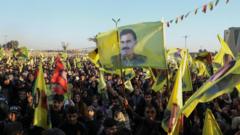**The PKK's decision to disarm raises complex questions about the future of peace, governance, and the rights of the Kurdish minority in Turkey.**
**A Cloud of Uncertainty Hangs Over PKK’s Disbandment Announcement**

**A Cloud of Uncertainty Hangs Over PKK’s Disbandment Announcement**
**As the Kurdish guerilla group concludes its decades-long conflict with Turkey, citizens express mixed emotions of skepticism and cautious optimism.**
After four decades marked by violence and losses, the Kurdistan Workers Party (PKK) is poised to end its long-standing conflict with the Turkish government. This historic step comes as a call from its imprisoned leader, Abdullah Ocalan, urging disarmament for the sake of democracy. The announcement signals the closure of one of the world's protracted conflicts and could reshape the dynamics between Turkey and its sizeable Kurdish population.
Government officials, including spokespersons from President Recep Tayyip Erdogan's ruling party, have hailed the announcement as a pivotal move towards a terror-free Turkey. However, the absence of clear guarantees or promises from the Turkish government in this context has left many citizens doubting the sincerity of the process.
In Diyarbakir, the unofficial capital of Kurdish identity in Turkey, residents display a range of sentiments regarding the potential for peace. Necmettin Bilmez, a 65-year-old driver, voiced his skepticism, arguing that without concrete affirmations of Kurdish rights, such as an official identification card, belief in government promises is unconvincing. Conversely, 80-year-old Mehmet Ek welcomed the disbandment announcement, expressing hope that it would pave the way for peace without further bloodshed.
Despite the general wish for an end to hostilities, many advocate for broader gestures of goodwill from the government, including the release of imprisoned Kurdish politicians as well as Ocalan himself. This notion resonates deeply with those who have lost family members to the conflict, such as Menice, a grieving mother who lost her son in a Turkish airstrike. For her and many others, true peace is linked to Ocalan’s freedom, which they believe would signal a significant change for Kurdish aspirations.
The streets of Diyarbakir bear the scars of conflict, yet many residents underscore that both sides have suffered greatly, promoting the idea that in the long run, nobody emerges as a true winner. Ibrahim Nazlican, age 63, encapsulated the widespread sentiment by asserting that all communities—both Turkish and Kurdish—have only experienced harm from the ongoing violence.
As political dynamics evolve, Erdogan's dependence on pro-Kurdish parties to stabilize his future presidency could result in promising developments. Meanwhile, the PKK’s operations have been significantly curtailed by the Turkish military, which has successfully engaged in targeted strikes against its leadership. The changing landscape in the surrounding regions, particularly in Iran and Syria, adds further complexity to the pathway towards resolving this deep-rooted conflict.
Despite the disbandment announcement, the future remains uncertain. Citizens are cautiously optimistic yet hold on to their skepticism, reflecting the fragile nature of peace in the face of decades of entrenched animosity and struggle.























